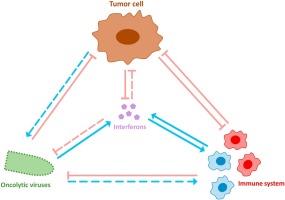The pros and cons of interferons for oncolytic virotherapy |
| |
| Affiliation: | 1. Cancer axis and Institut du cancer de Montréal, Centre de recherche du CHUM- CRCHUM, 900 St-Denis Street, Viger Tower, Room R10.480, Montreal, Quebec, H2X0A9, Canada;2. Département de Microbiologie, Infectiologie et Immunologie, Faculty of Medicine, Université de Montréal, 2900 Edouard-Montpetit Boulevard, Roger-Gaudry Building, Montreal, Quebec, H3T1J4, Canada |
| |
| Abstract: | 
Interferons (IFN) are potent immune stimulators that play key roles in both innate and adaptive immune responses. They are considered the first line of defense against viral pathogens and can even be used as treatments to boost the immune system. While viruses are usually seen as a threat to the host, an emerging class of cancer therapeutics exploits the natural capacity of some viruses to directly infect and kill cancer cells. The cancer-specificity of these bio-therapeutics, called oncolytic viruses (OVs), often relies on defective IFN responses that are frequently observed in cancer cells, therefore increasing their vulnerability to viruses compared to healthy cells. To ensure the safety of the therapy, many OVs have been engineered to further activate the IFN response. As a consequence of this IFN over-stimulation, the virus is cleared faster by the immune system, which limits direct oncolysis. Importantly, the therapeutic activity of OVs also relies on their capacity to trigger anti-tumor immunity and IFNs are key players in this aspect. Here, we review the complex cancer–virus–anti-tumor immunity interplay and discuss the diverse functions of IFNs for each of these processes. |
| |
| Keywords: | Interferon Oncolytic virus Cancer Anti-tumor immunity Immune stimulation Inflammation |
| 本文献已被 ScienceDirect 等数据库收录! |
|

